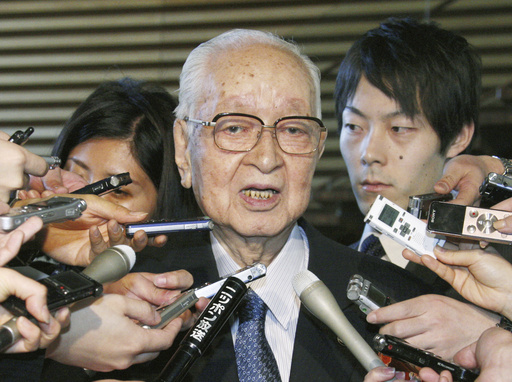
Tsuneo Watanabe, the influential leader of Japan’s largest newspaper, has passed away at the age of 98, his company announced on Thursday. Watanabe, who served as editor-in-chief of the Yomiuri Shimbun for more than three decades, succumbed to pneumonia at a hospital in Tokyo.
Beginning his career with the Yomiuri in 1950, Watanabe dedicated his life to political journalism and remained an active presence in editorial discussions until just last month. Reports indicate that he continued reviewing articles from his hospital bed a few days prior to his passing.
Throughout his tenure, Watanabe fostered strong relationships with numerous conservative political figures, including Yasuhiro Nakasone and Shinzo Abe. His influence played a significant role in shaping conservative sentiment in Japan. Abe, a devoted reader of the Yomiuri, once remarked that all his thoughts on governance could be found in the pages of the newspaper when discussing a potential amendment to the constitution.
Watanabe was at the center of a contentious issue in 1994 when the Yomiuri published a proposed revision to Japan’s pacifist constitution, advocating for an explicit acknowledgment of the Self-Defense Force, which functions as the nation’s military, among other adjustments. This stance was particularly provocative at that time.
Watanabe was born in Tokyo in May 1926 and pursued a degree in philosophy at the University of Tokyo. His studies were interrupted when he was conscripted into the Imperial Army during World War II, but he joined the Yomiuri shortly after the war ended.
Throughout his career, he expressed criticism of the wartime military’s treatment of soldiers and pointed out the unnecessary loss of life during that era. He publicly opposed the veneration of war criminals at the controversial Yasukuni Shrine in Tokyo, where visits by conservative lawmakers drew his strong disapproval.
Prime Minister Shigeru Ishiba shared his admiration for Watanabe, reflecting on their many meetings and the valuable lessons he learned from him regarding Japan’s wartime history. Ishiba mentioned that he recently revisited one of Watanabe’s books, appreciating its depth, especially during a challenging time for his party following an election setback. He expressed a desire for more guidance from Watanabe on matters concerning the future of democracy and Japan’s peaceful stance in the world.
In his earlier roles at the Yomiuri, Watanabe served as the bureau chief in Washington and led the political news division before ascending to the presidency and editorship of the publication in 1991. He subsequently became the chairman of the Yomiuri Shimbun in 2004.
Remarkably, despite a brief association with communism during his university years, Watanabe evolved into a fervent anti-communist figure. Additionally, he was known for his ownership of the Yomiuri Giants, the country’s most popular baseball team, and his involvement in advisory positions related to sumo wrestling.

